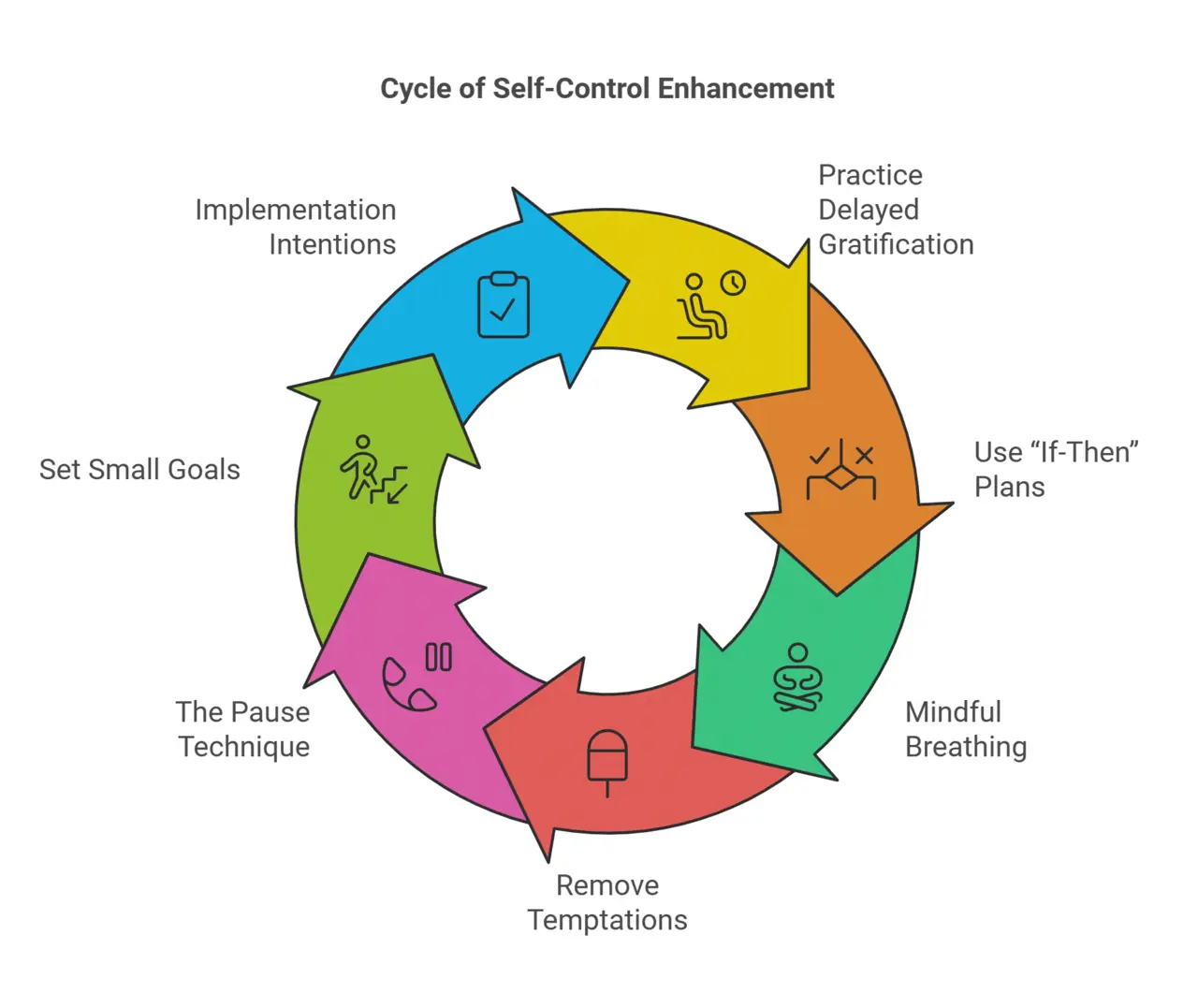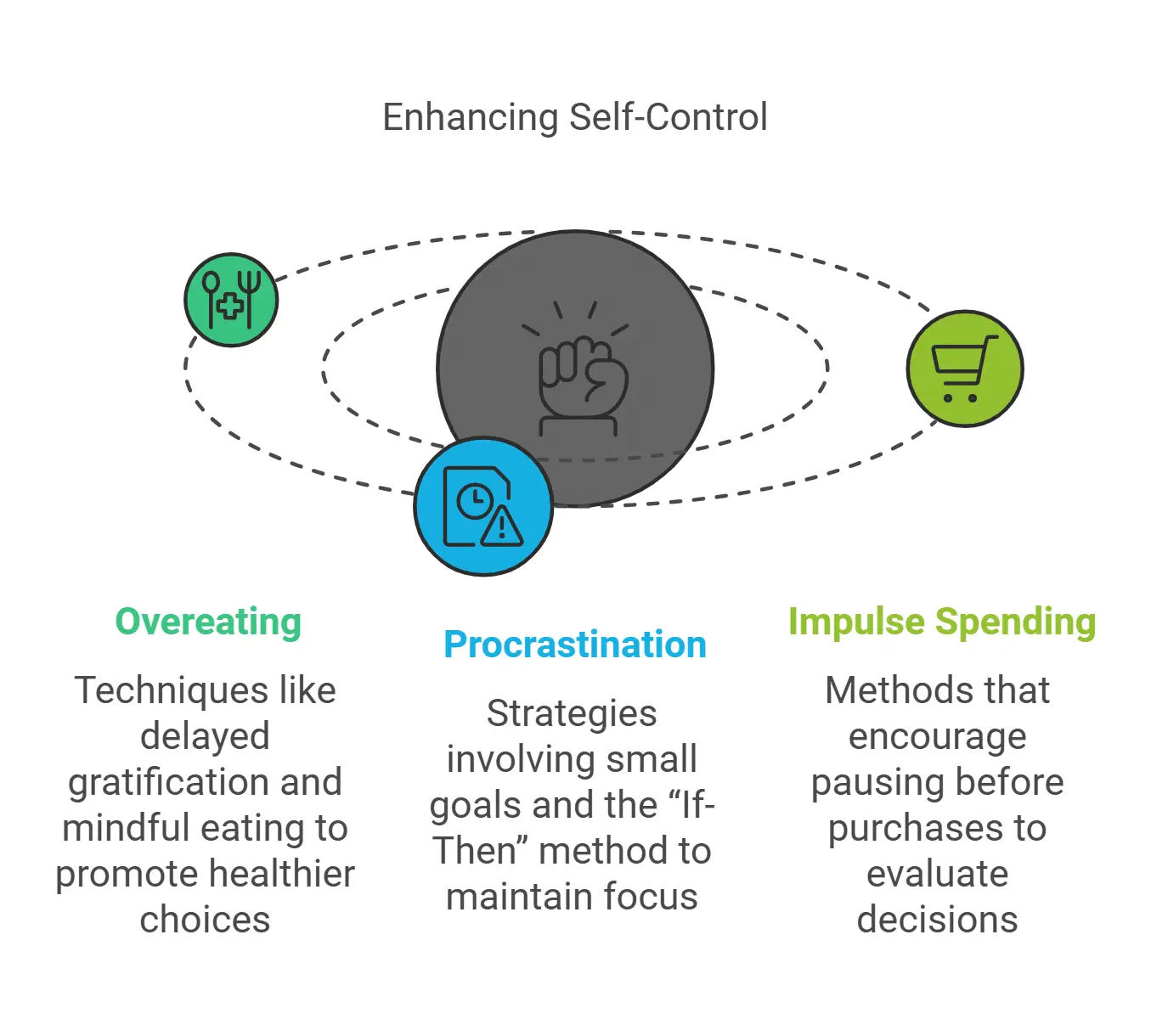Self-Control Exercises for Beginners: Practical Steps to Build Willpower

Self-control is often seen as the backbone of personal success and well-being. Maybe you want to resist that tempting snack, focus on your work, or avoid procrastination, self-control plays a central role. But what if self-control doesn’t come naturally to you? The good news is that self-control isn’t just an innate trait, it’s a skill you can build with practice.
In this article, we will explore simple self-control exercises for beginners. You’ll learn why developing self-control matters and how it impacts your everyday life. You’ll also discover actionable techniques to help you strengthen your willpower. These exercises are easy to incorporate into your routine and can make a significant difference over time.
What Are Self-Control Exercises?
Self-control exercises are strategies to help you manage impulses and stay focused on long-term goals. Just like physical exercise builds muscle, these exercises strengthen your ability to resist short-term temptations.
This practice helps you focus on lasting rewards. They allow you to step back and pause. This moment of reflection helps you consciously decide what aligns with your long-term priorities. It allows you to pause and avoid giving in to fleeting urges.
These small moments add up and can have a big impact on your personal growth. Over time, practicing these exercises helps you build mental discipline and resilience. These qualities are essential for achieving success and happiness in the long run.

Why Is Self-Control Important?
Self-control is tied to nearly every area of life. It plays a critical role in achieving personal goals, improving relationships, and managing stress. These everyday outcomes shape your success and well-being. Here’s how it can benefit you:
Self-control gives you the power to choose actions that align with your long-term happiness and success. It prevents you from falling victim to short-term impulses and regrets. It creates a ripple effect that positively influences nearly every aspect of your life. How Do I Know If I Need Self-Control Exercises?
If you often find yourself:
Then you could benefit from simple self-control exercises. These patterns are normal, and many people struggle with them, but the right techniques can help you improve. The key is recognizing these behaviors and taking steps to strengthen your self-discipline.
Subscribe to Create Higher Vibrations!
Get Inspiration and Practical advice straight to your inbox.
Are Self-Control Exercises Difficult?
The idea of building self-control might feel intimidating, but it doesn’t have to be hard. Start small. Just like any other skill, self-control improves with consistent, manageable effort.
Think of it like lifting weights at the gym, you start light, build strength gradually, and soon you can handle much more than you thought possible.
Simple steps like mindful breathing, creating clear plans, and practicing brief pauses can be incredibly effective. These exercises don’t require much time or energy but can deliver powerful results when practiced regularly.
Progress matters more than perfection. Even small wins, like choosing water instead of soda, can reinforce your willpower and help you feel accomplished. Each success builds your confidence and encourages further progress.
How Often Should You Practice Self-Control Exercises?
Consistency is key. Ideally, practice small self-control exercises daily. Think of them as short mental workouts that add up over time. Don’t worry if it feels challenging at first—small steps count. Even a few minutes of practice each day can make a noticeable difference.
For instance:
Over time, these exercises will feel more natural. The goal is to make self-control a habit—something you can rely on automatically in everyday situations.
How Long Does It Take to See Results?
The time it takes to see results varies for each person. Some people notice small changes within a week, such as better focus, fewer emotional outbursts, or a sense of accomplishment. Larger changes, like breaking a bad habit or achieving long-term goals, may take several months of consistent practice.
Research shows that self-control, much like a muscle, gets stronger with repeated use. Stay patient and trust the process, small changes lead to bigger transformations over time. Celebrate your progress, no matter how small, and remind yourself that each effort brings you closer to success.

Simple Self-Control Exercises for Beginners
Here are practical, easy-to-implement self-control exercises you can start today. These strategies are grounded in research that demonstrates the powerful role self-control plays in shaping personal success and well-being.
1. Practice Delayed Gratification
The famous Marshmallow Test by psychologist Walter Mischel revealed the long-term benefits of delayed gratification.
In the study, children who resisted eating one marshmallow in exchange for a larger reward later showed better academic performance, social skills, and overall well-being in life. This demonstrates that self-control is not purely innate, it’s a skill that can be cultivated.
2. Mindful Breathing
Mindfulness practices, such as meditation and mindful breathing, have been shown to enhance self-control.
According to Jon Kabat-Zinn, mindfulness helps individuals become more aware of their thoughts and emotions without judgment, making it easier to resist impulses and make conscious choices.
3. Remove Temptations
Just as self-control can be strengthened, it can also be depleted with overuse. Research on ego depletion by Baumeister et al. suggests that willpower is like a muscle, it can tire with repeated use but can be strengthened over time. An effective way to preserve willpower is by removing unnecessary temptations from your environment.
4. The Pause Technique
Before making a decision (big or small), pause for a moment. Neuroscientific research highlights the prefrontal cortex (PFC) as the brain’s control center for self-discipline.
Engaging the PFC through intentional pauses allows you to resist impulses and make better decisions.
Ask yourself:
This intentional pause activates conscious decision-making instead of reactive behaviors.
5. Set Small, Achievable Goals
Breaking goals into small, manageable steps builds momentum and prevents overwhelm. This strategy aligns with cognitive behavioral therapy (CBT) techniques, which focus on realistic, step-by-step changes to improve self-control (Beck, 1976).
6. Implementation Intentions
The concept of implementation intentions (planning specific actions) is effective in improving self-control. By making clear “if-then” statements, individuals are more likely to follow through with their desired behaviors. For example:
Research by psychologist Peter Gollwitzer highlights how these preplanned responses can remove uncertainty and strengthen self-control. Creating these intentional plans provides a clear strategy to manage impulses and align actions with your goals.

Can Self-Control Exercises Help With Specific Issues?
Absolutely. Self-control exercises are especially effective for tackling common struggles like:
Final Thoughts
Self-control isn’t about being perfect, it’s about making small, intentional choices that align with your values and goals. With consistent practice, you’ll notice changes in your habits, productivity, and overall well-being.
Start small. Choose one exercise, whether it’s pausing before acting, practicing mindful breathing, or setting an “If-Then” plan, and stick with it. Each step forward, no matter how small, builds a stronger foundation of self-discipline for your future.


